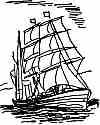 This foundry, being in the North End of Boston, naturally brought
Revere into close contact with the shipyards. Right after the
Revolution, the ship-builders had a hard time getting sheet copper from
England for the bottoms of their ships. This shortage was a great
handicap to the young industry. One American tried to get around this
by just leaving off the copper but after the ship had been at sea for a
short time it became so covered with barnacles that even with a strong
wind it would travel only about two miles an hour. Copper sheathing
seemed to be as important to ships as sails.
This foundry, being in the North End of Boston, naturally brought
Revere into close contact with the shipyards. Right after the
Revolution, the ship-builders had a hard time getting sheet copper from
England for the bottoms of their ships. This shortage was a great
handicap to the young industry. One American tried to get around this
by just leaving off the copper but after the ship had been at sea for a
short time it became so covered with barnacles that even with a strong
wind it would travel only about two miles an hour. Copper sheathing
seemed to be as important to ships as sails.Although he was well over sixty, Paul Revere thought he could find a way to roll copper sheets and meet this urgent demand. And so he started his research work on a project that had far greater results than his midnight ride. In 1801, he wrote in a letter to a Member of Congress, which said in effect: "It is
the universal belief that no one in this country could make
Copper so malleable as to hammer it hot... I determined, if possible,
to find the secret and have pleasure to say that, after a great many
trials and much expense, I have learned it."
In that year, at the age of 67, he built the first copper rolling mill in this country at Canton, Massachusetts. And the interesting thing is that 143 years later this company is still rolling copper sheets together with aluminum and magnesium and a direct descendant of Paul Revere is still in the business! |








